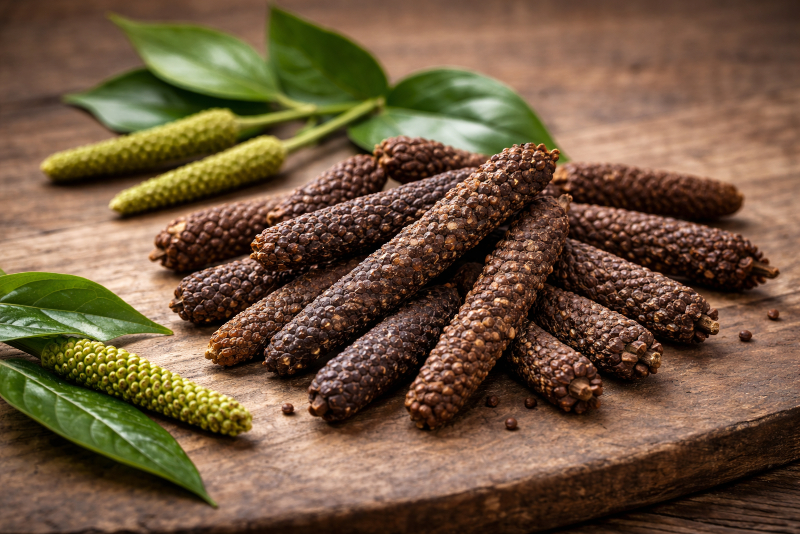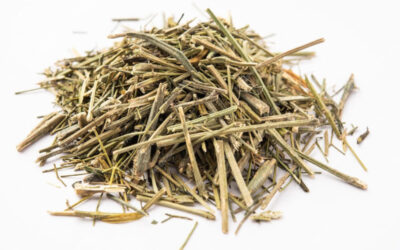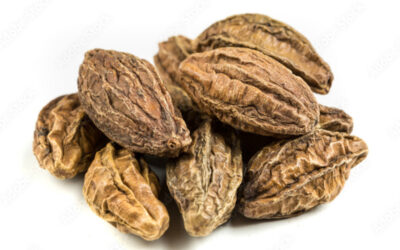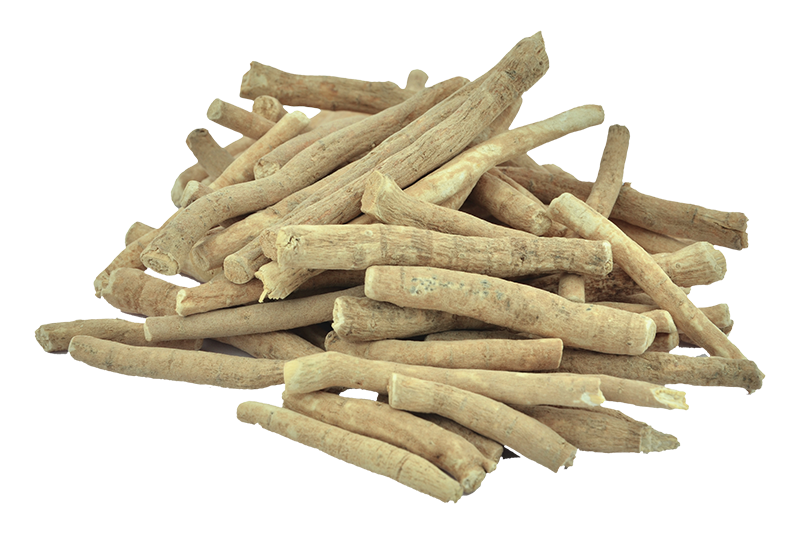
Featured In Vouge magazine: “It’s been dubbed a “cure-all” herb, but how much of a role does timing play in its prowess?”
Available in 5 and 25 Kg packs
Product Details
Origin: India
Production: Ashwagandha (Withania somnifera) is native to the dry regions of India.
Name: Ashwagandha, Indian ginseng, Winter Cherry, and Ajagandha.
Nomenclature: Withania somnifera is the botanical name for Ashwagandha. The genus name is Withania, and the species name is somnifera. This binomial nomenclature system follows standard taxonomy rules.
Brief History:
Ashwagandha, scientifically known as Withania somnifera, has a rich history deeply rooted in traditional medicine and cultural practices.
Ashwagandha finds its roots in Ayurveda, the ancient Indian system of medicine. It has been used for over 3,000 years to promote overall well-being, vitality, and longevity. Ashwagandha is mentioned in classical Ayurvedic texts, including the Charaka Samhita and Sushruta Samhita (Sanskrit Texts), where it is valued for its adaptogenic properties, promoting vitality and enhancing the body’s resilience to stress. In Ayurveda, Ashwagandha is classified as a “Rasayana,” a rejuvenating herb believed to promote physical and mental health, improve longevity, and boost the immune system. Throughout history, 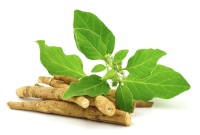 Ashwagandha has been used to address various health issues, including stress, fatigue, inflammation, and cognitive function. It has been considered a traditional remedy for promoting strength and stamina. The name “Ashwagandha” is derived from Sanskrit, with “Ashwa” meaning horse and “Gandha” meaning smell. This name alludes to the herb’s root, which is believed to have a horse-like odor and is associated with providing the strength and vitality of a horse. In modern times, Ashwagandha has gained international popularity for its adaptogenic properties. It is used in herbal supplements and traditional medicine systems beyond Ayurveda, with research exploring its potential benefits for stress reduction, cognitive function, and overall well-being. Ashwagandha’s enduring presence in traditional medicine, coupled with its growing recognition in contemporary health and wellness practices, highlights its significance as a versatile and revered herb with a deep historical legacy.
Ashwagandha has been used to address various health issues, including stress, fatigue, inflammation, and cognitive function. It has been considered a traditional remedy for promoting strength and stamina. The name “Ashwagandha” is derived from Sanskrit, with “Ashwa” meaning horse and “Gandha” meaning smell. This name alludes to the herb’s root, which is believed to have a horse-like odor and is associated with providing the strength and vitality of a horse. In modern times, Ashwagandha has gained international popularity for its adaptogenic properties. It is used in herbal supplements and traditional medicine systems beyond Ayurveda, with research exploring its potential benefits for stress reduction, cognitive function, and overall well-being. Ashwagandha’s enduring presence in traditional medicine, coupled with its growing recognition in contemporary health and wellness practices, highlights its significance as a versatile and revered herb with a deep historical legacy.
Physical Properties:
Ashwagandha (Withania somnifera) is a small shrub with greenish-yellow flowers and oval leaves. The plant’s height can vary, and it produces small, orange-red berries. The root of Ashwagandha is the primary part used for medicinal purposes. It is brown and roughly cylindrical, with a distinct earthy smell, often described as horse-like, which is reflected in 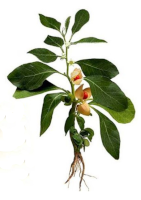 its name. Ashwagandha contains various bioactive compounds, including alkaloids (such as withanine), steroidal lactones (including withanolides), and other phytochemicals. These compounds contribute to the herb’s pharmacological properties. The active components in Ashwagandha, particularly withanolides, are not highly water-soluble. Extracts are often prepared using hydrophobic solvents like ethanol to isolate these compounds. Ashwagandha root has a bitter taste, which is characteristic of many adaptogenic herbs. The distinct earthy smell of the root contributes to its naming, “Ashwagandha,” meaning the smell of a horse in Sanskrit. In traditional Ayurvedic medicine, Ashwagandha is categorized as a “Rasayana” herb, indicating its use as a rejuvenating and revitalizing agent. It is believed to balance the “Vata” dosha. Ashwagandha is commonly consumed in various forms, including powdered root, capsules, or as a part of herbal formulations. The root can also be decocted or infused in teas. Ashwagandha is cultivated in different regions, particularly in India. It is adaptable to various climates and is known for its resilience in challenging environmental conditions.
its name. Ashwagandha contains various bioactive compounds, including alkaloids (such as withanine), steroidal lactones (including withanolides), and other phytochemicals. These compounds contribute to the herb’s pharmacological properties. The active components in Ashwagandha, particularly withanolides, are not highly water-soluble. Extracts are often prepared using hydrophobic solvents like ethanol to isolate these compounds. Ashwagandha root has a bitter taste, which is characteristic of many adaptogenic herbs. The distinct earthy smell of the root contributes to its naming, “Ashwagandha,” meaning the smell of a horse in Sanskrit. In traditional Ayurvedic medicine, Ashwagandha is categorized as a “Rasayana” herb, indicating its use as a rejuvenating and revitalizing agent. It is believed to balance the “Vata” dosha. Ashwagandha is commonly consumed in various forms, including powdered root, capsules, or as a part of herbal formulations. The root can also be decocted or infused in teas. Ashwagandha is cultivated in different regions, particularly in India. It is adaptable to various climates and is known for its resilience in challenging environmental conditions.
Health benefits of Ashwagandha
- Stress Reduction: Ashwagandha is renowned for its adaptogenic properties, helping the body adapt to stressors and promoting a sense of calm. It may reduce cortisol levels, the hormone associated with stress.
- Improved Sleep: Due to its calming effects, Ashwagandha is often used to support better sleep quality and address mild insomnia.
- Enhanced Cognitive Function: Some studies suggest that Ashwagandha may support cognitive function and memory. It is believed to have neuroprotective properties that may benefit brain health.
- Balanced Mood: Ashwagandha may have a positive impact on mood and may be used as a natural remedy for mild mood imbalances.
- Anti-Inflammatory Properties: The herb exhibits anti-inflammatory effects, potentially reducing inflammation in the body. This may be beneficial for conditions related to chronic inflammation.
- Immune System Support: Ashwagandha is known for its immunomodulatory effects, which may help support a healthy immune system and enhance the body’s defense mechanisms.
- Energy and Vitality: Ashwagandha is traditionally used to combat fatigue and enhance overall energy levels, promoting vitality and endurance.
- Hormonal Balance: The herb may have adaptogenic effects on hormonal balance, potentially benefiting both men and women in maintaining reproductive health.
- Antioxidant Properties: Ashwagandha contains antioxidants that may help combat oxidative stress and protect cells from damage caused by free radicals.
- Blood Sugar Regulation: Some research suggests that Ashwagandha may help regulate blood sugar levels, making it potentially beneficial for individuals with diabetes or those at risk of developing the condition.
- Cholesterol Management: Studies have indicated that Ashwagandha may contribute to lowering cholesterol levels, particularly LDL cholesterol.
Nutritional Value: 100 g of Ashwagandha contains
Ingredients: Calories: 34 calories per 100 grams. Protein: 2-3 grams, Carbohydrates: 43-49 grams, Fat: 1 gram, Dietary Fiber: 35 grams, Vitamins and Minerals: While Ashwagandha is not particularly rich in vitamins and minerals, it does contain small amounts of certain micronutrients, including iron and calcium.
Uses:
Ashwagandha (Withania somnifera) has been used for centuries in traditional Ayurvedic medicine for its various potential health benefits. While research is ongoing, some of the commonly attributed uses of Ashwagandha include:
1. Adaptogenic Properties: Ashwagandha is classified as an adaptogen, which means it may help the body adapt to stressors and maintain balance. It is believed to support the adrenal glands and the body’s stress response.
2. Stress and Anxiety Reduction: Some studies suggest that Ashwagandha may help reduce symptoms of stress and anxiety. It may have a calming effect on the central nervous system.
3. Improved Energy and Stamina: Ashwagandha is thought to enhance physical performance and increase energy levels.It may support overall vitality and stamina.
4. Cognitive Function: There is some evidence to suggest that Ashwagandha may have neuroprotective effects and could support cognitive function. It may help improve memory and concentration.
5. Anti-Inflammatory Properties: Ashwagandha is believed to have anti-inflammatory effects, which could be beneficial for conditions associated with inflammation. It may help modulate the immune system.
6. Antioxidant Effects: The herb is rich in antioxidants, which can help combat oxidative stress and protect cells from damage. Antioxidants are important for overall health and may contribute to anti-aging effects.
7. Hormonal Balance: Ashwagandha may have a role in hormonal balance, particularly in supporting the thyroid gland. It could have potential benefits for individuals with hypothyroidism.
8. Sleep Aid: Some people use Ashwagandha as a natural remedy for improving sleep quality. It may help regulate sleep patterns and promote relaxation.
9. Immune System Support: The herb is believed to have immune-modulating properties, assisting the body in maintaining a healthy immune response.
10. Anti-Cancer Properties: Some studies suggest that Ashwagandha may have potential anti-cancer effects, although more research is needed in this area.
